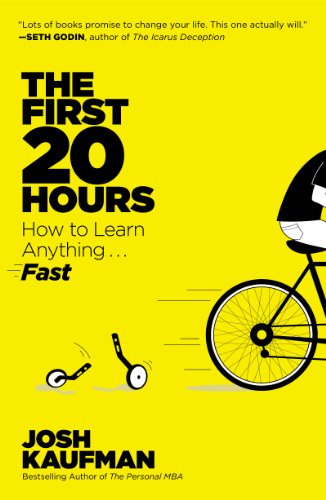
Notes on
The First 20 Hours
by Josh Kaufman
• 3 min read
What is rapid skill acquisition?
Breaking the skills down into small parts and finding the most important parts, and deliberately practicing them.
- Deconstructing
- Learning
- Removing (barriers)
- Practicing the most important subskills
If you want to get food at anything where real live performance matters, you have to actually practice that skill in context. Study, by itself, is never enough.
The three stage model of skill acquisition
- Cognitive (early) stage. Understanding what you’re trying to do, researching, thinking about the process, and bring the skill into manageable parts.
- Associative (intermediate) stage. Practicing the task, noticing environmental feedback, and adjusting your approach based on that feedback.
- Autonomous (late) stage. Performing the skill efficiently without thinking about it or paying unnecessary attention to the process.
Ten principles of rapid skill acquisition
- Choose a loveable project
- Focus your energy on over skill at a time
- Define your target performance level
- Deconstruct the skill into subskills
- Obtain critical tools
- Eliminate barriers to practice
- Make dedicated time for practice
- Create fast feedback loops
- Practice by the clock in short bursts
- Emphasize quantity and speed
Target performance level = define how good is good enough.
A specific, single, sentence.
“A problem well stated is a problem half solves” - Charles Kettering.
Barriers include:
- significant pre-practice effort
- intermittent resource availability
- environmental distractions
- emotional blocks
You can’t rely on willpower to push through barriers.
You must make time, because you won’t just find time.
The best forms of feedback are near instantaneous.
Recording yourself works. Coaches too.
Emphasize quantity and speed, but make sure that your form, at least, is good enough. Good enough to pass your target performance level standards.
10 Principles of Effective Learning
- Research the skill and related topics
- For at least 20 minutes when starting, identify the top resources. Just skim through material.
- Jump in over your head
- Being afraid of doing this is the biggest barrier of all. By doing it, you’ll learn way faster.
- Identify mental models and mental hooks
- Mental hooks: analogies and metaphors you can use to easily remember things
- Imagine the opposite of what you want
- Imagining the worst possible outcome is called inversion. It will help you know how to prevent disaster.
- Talk to practitioners to set expectations
- Eliminate distractions in your environment
- This may be letting people know that you’re busy, putting your phone away, or just going somewhere quiet.
- Use spaced repetition and reinforcement for memorization
- SRS (spaced repetition software) like Anki work really well for this. Flash cards.
- Create scaffolds and checklists
- Make the routines easy.
- Scaffolds are structures that ensure you approach the skill the same way every time (think routines).
- Make and test predictions
- Honor your biology
Sleep is incredibly important in order to learn anything.
Deliberate practice is necessary in order to improve.
“Achievement seems to be connected with action. Successful men and women keep moving. They make mistakes, but they don’t quit.” - Conrad Hilton
Liked these notes? Join the newsletter.
Get notified whenever I post new notes.